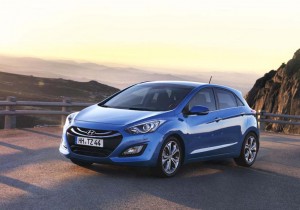You’d have a hard time telling there are any problems in Europe if you’re only looking at Hyundai’s sales numbers. Despite the Continent’s economic crisis and the sharp downturn in overall sales, demand for the Korean makers products jumped during the second quarter – driving a 10% increase in the maker’s overall earnings.
Hyundai is one of the few brands that has proven relatively immune to the European crisis that has nations like Greece and Spain on life support while even Germany’s auto market is feeling the economic pinch. The Korean carmaker appears to be benefiting from its reputation for bargain pricing even as it launches a wave of well-received new products, such as the i40 sedan and ix35 crossover.
Hyundai’s strong performance comes in sharp contrast to most of the rest of the industry. Ford reported a 57% downturn in Q2 profits, largely the result of European losses, while General Motors is expected to post a major loss in Europe next week. Volkswagen saw earnings rise for the quarter, but largely due to foreign sales with senior executives admitting the situation on the Continent is worsening.
Hyundai sales, by contrast, surged by double-digits in Europe, underpinning the Korean carmaker’s 13th consecutive quarter of increased earnings. Net profits climbed to 2.55 trillion won ($2.22 billion), in line with analysts’ expectations. Overall, worldwide sales for the quarter topped 1.11 million vehicles, a record.
Hyundai’s performance in Europe was clearly aided by a free trade agreement Korea inked with the European Union and which took effect last year. That resulted in reduced duties that further enhanced the competitiveness of Korean products which have traditionally offered a pricing advantage of Europe’s own brands.
But the sharp contrast between Hyundai’s recent, strong performance in a car market that is otherwise starting to free-fall has raised some flags, the new Socialist administration that recently took over in France warning it may press the EU to take action if Korea imports continue to rise.
Ironically, that trade deal has had a downside, the long-closed Korean market suddenly seeing a surge of demand for European brands, such as BMW and Mercedes-Benz. Compounded by the overall malaise in the Korean market, Hyundai sales there fell 5% for the first half of 2012.
Hyundai also saw a decline in demand in China, one of its fastest-growing export markets. China has been experiencing an unexpected slowdown in its new car market in recent months and, at best, forecasters expect to see sales grow between 8 to 12% this year, far short of the typical pace over the last decade. For the first half, the growth rate was just 2.9%.
That comes at a bad time considering the maker is just opening its third assembly plant in the People’s Republic.
Hyundai has other issues facing it. The company recently faced a brief strike, increasingly militant workers warning they could return to the confrontational waves of years past after a period of labor harmony if they don’t win better wages and reduced hours. They have returned to the bargaining table since the July 13 walkout but the company is all but certain to face an increase in its labor costs.
(Click Here for that story.)
Complicating matters, Hyundai is now struggling to deliver enough products to meet demand in its largest external market, the United States. The maker has scored a series of successes with products like the sleekly styled Sonata and smaller Elantra sedans, generating a series of record sales and sharp increases in market share.
But Hyundai Motor America CEO John Krafcik has warned the maker could actually lose share for all of 2012 because it can’t even keep pace with the overall upturn in the U.S. market. Hyundai is struggling to break bottlenecks at its U.S. assembly plant, as well as in Korea, but the company could be forced to invest in a new American facility or at least expand its existing one, if it doesn’t want to lose its current momentum.

